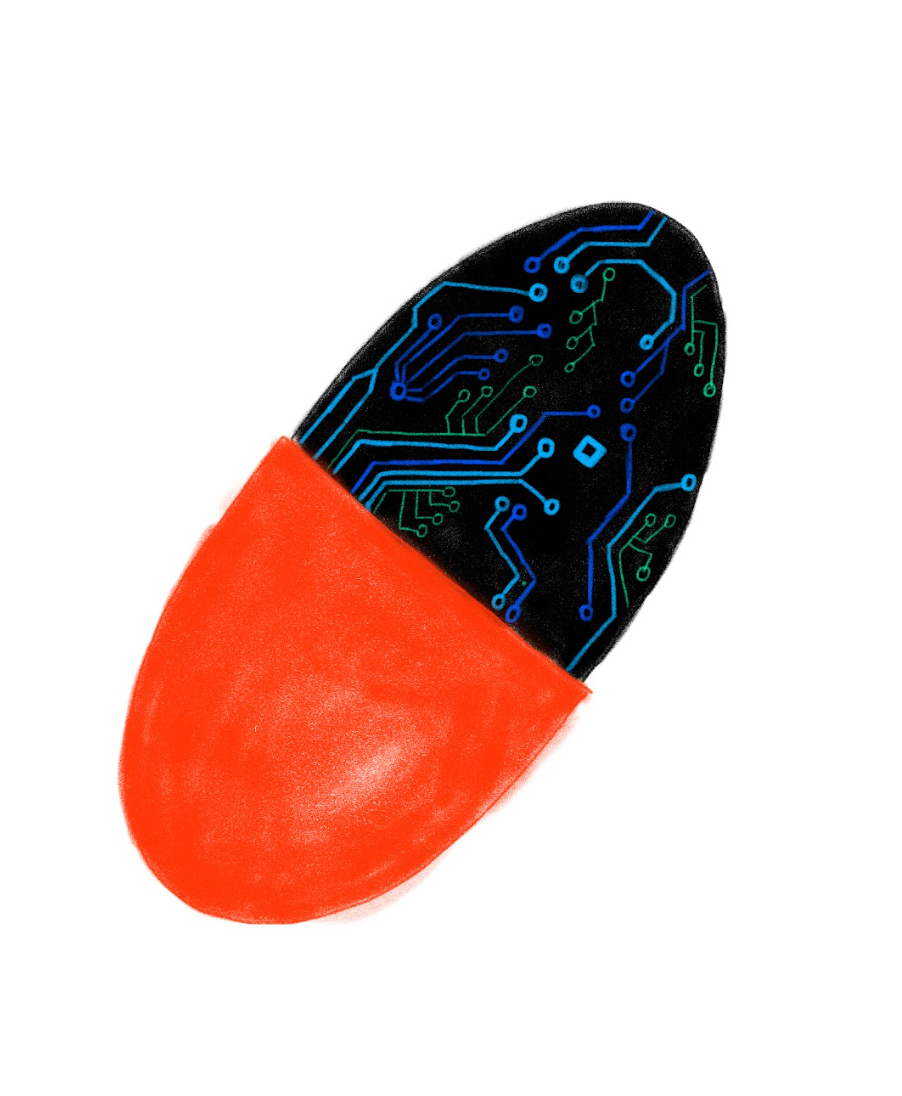Authored by: Josh Chelliah
Art by: Michelle Choi
The idea of voyaging the human body’s pathways and systems has been theorized and depicted in movies and television shows such as "Osmosis Jones" and "Phineas and Ferb". This idea is quickly becoming feasible with the advent of "Smart pills"- digital pills that are safe to consume and monitor the gastrointestinal (GI) tract, collect health data, record images, and, especially intriguing, deliver medications [1]. This revolutionary pill helps mitigate potential life-threatening problems that happen during invasive procedures such as surgery while also evaluating the same, necessary measurements at the same time.
Smart pills, digital pills, monitor and transmit physiological data from inside the human body [1]. These pills are a type of ingestible electronic device that patients can swallow, and they typically contain sensors, cameras, or microchips to track various health metrics. Applications of such smart pills include endoscopy, or medical imaging, for gastrointestinal (GI) diagnostics, and monitoring internal conditions such as pH or temperature in real-time for patients with diabetes or cardiovascular diseases [2]. While there are obvious benefits to such non-invasive techniques, there are also plenty of concerns regarding privacy and security. With apt regulation, Smart pills represent a growing area in the field of healthcare technology. Smart pills have the potential to revolutionize diagnostics and patient management especially in areas that benefit from continuous monitoring and non-invasive care/testing.
Physician-scientists from NewYork- Presbyterian/Weill Cornell Medical Center have used smart pills in patients with ulcerative colitis (UC) to measure pH throughout the digestive tract. This helped determine how pH levels fluctuate, which is critical because mesalamine, the primary drug for UC, only activates at a pH of 7 or higher. Smart pills are administered in a physician’s office which allows the patient to continue their normal routine throughout the test. As the pill courses through the GI tract, it transmits important data such as pH, pressure, or temperature to a wearable data receiver. After the single-use Smart Pill has been expelled from the patient’s body, the physician downloads the data from the data receiver to a computer for analysis. Using this technology, the researchers were able to determine that patients with UC had severe issues with maintaining a pH of 6 or higher in their colons. This has led to the formulation and approval of medication that initiates the release of mesalamine at a pH equal to 6, bringing relief to a vast majority of UC patients.
Engineers at the University of Southern California have developed AI-powered wearable electronics that track Smart Pills and that can detect certain gases such as ammonia that could be a precursor to serious conditions such as gastric cancer, peptic ulcer, or irritable bowel syndrome (IBS) [4]. Furthermore, researchers at the University of Sydney have developed a Smart Pill that aims to alleviate the pain of 75 million patients who live with diabetes. This smart pill monitors the blood glucose of the patient in real time. When the blood glucose exceeds the limit programmed, the pill kick-starts the process of breaking down the glucose and delivers the exact amount of insulin needed by the patient [5]. This demonstrates that the smart pill is ahead of its time in the field of medical technology.
Smart Pills offer several benefits to healthcare and are especially useful in conditions that require long-term monitoring, adherence to timely medication, or gastronomical health assessments. Key advantages include medication adherence, real-time monitoring, accurate data collection, non-invasive diagnostics, customized treatment plans, improved clinical trials, and enhanced patient engagement.
However, smart pills also come with several risks and challenges, such as privacy and data security, malfunctions, discomfort, allergic reactions, obstruction in the gut, invasiveness, high cost, limited regulatory oversight, and lack of clear regulations.
Balancing the potential benefits against these risks is key to the successful and ethical implementation of this technology. Patients considering smart pills need to carefully weigh the benefits of real-time data, improved medication adherence, and non-invasive diagnostics against the risks of privacy concerns, technical malfunctions, and potential physical side effects. For patients with chronic conditions or those undergoing complex treatments, the benefits of enhanced monitoring and data collection may outweigh the risks, particularly if the technology is secure and well-monitored. With proper governmental oversight, smart pills could transform healthcare, especially through continuous monitoring and non-invasive diagnostics, revolutionizing patient management.
Works Cited
“Smart Pills to Help Diagnose Gut Disorders.” NSF, 19 Apr. 2023, new.nsf.gov/news/smart-pills-help-diagnose-gut-disorders.
Sharma, Saransh, et al. “Location-Aware Ingestible Microdevices for Wireless Monitoring of Gastrointestinal Dynamics.” Nature News, Nature Publishing Group, 13 Feb. 2023, www.nature.com/articles/s41928-023-00916-0.
Weill Cornell Medicine. (2009, June 3). Electronic pill shows its smarts by measuring ph levels in digestive tract. WCM Newsroom. https://news.weill.cornell.edu/news/2009/06/electronic-pill-shows-its-smarts-by-measuring-ph-levels-in-digestive-tract#:~:text=NEW%20YORK%20(June%203%2C%202009,that%20 may%20 impact%20treatment%20 strategy
Blumenthal, A. (2024, August 13). From wearables to swallowables: USC Engineering researchers create GPS-like smart pills with Ai - USC Viterbi: School of Engineering. USC Viterbi | School of Engineering. https://viterbischool.usc.edu/news/2024/06/from-wearables-to-swallowables-usc-engineering-researchers-create-gps-like-smart-pills-with-ai/
Radio New Zealand. (2024, August 17). No more needles? how an insulin pill could revolutionise diabetes treatment. RNZ. https://www.rnz.co.nz/news/national/525434/no-more-needles-how-an-insulin-pill-could-revolutionise-diabetes-treatment


Komentarze